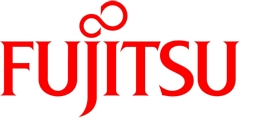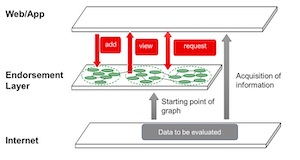Fujitsu, Keio Research Institute at SFC lay foundation for a Trustable Internet

TOKYO, Oct 13, 2022 – (JCN Newswire via SEAPRWire.com) – Fujitsu and the Keio Research Institute at SFC today published a white paper on the concept of a Trustable Internet, which enables verification of the authenticity of data on the Internet in a general-purpose manner by adding a new layer, the so-called “Endorsement Layer,” between the existing Internet layer and the app/web layer. The white paper contains the results of research conducted at the “Trusted Internet Architecture Laboratory”(1).
 |
Trustable Internet will enable users to confirm the credibility of various data on the Internet that has previously been difficult to verify based on additional information related to the generation and processing of the data, information on confirmation and evaluation by third parties that have viewed the data, and information on physical space related to the data (sensor data, etc.). This enables users to judge the credibility of data from a variety of perspectives to ultimately prevent the use of unverified data and the spread, unintentional or otherwise, of false and unverified information (“fake news”).
Moving forward, Fujitsu and the Keio Research Institute at SFC will promote the development of new technologies at the Trusted Internet Architecture Laboratory with the aim to contribute to the realization of a “Trustable Internet” by fiscal 2028 by implementing an “Endorsement Layer,” apps and browser functions to verify the authenticity of data from users’ devices.
Fujitsu and the Keio Research Institute at SFC initially presented the “Trustable Internet” concept at the W3C (World Wide Web Consortium) annual meeting and the W3C TPAC 2022 meeting (September 12-16, 2022) and defined the concept based on the opinions of various experts.
Background
The intentional spread of false or unverifiable information and data on the internet represents a growing threat to society, and by some estimates so-called “fake news” costs the global economy at least $78 billion per year(2).
Conventional methods to ensure the authenticity of data include data tracking systems such as document approval management systems and luggage delivery tracking systems that use individual methods to record data trails.
However, the verification of large amounts of information on the Internet remains a difficult task, highlighting the need for a general-purpose method to prove the authenticity of data.
To address these issues, Fujitsu and the Keio Research Institute at SFC published their white paper outlining the concept of a “Trustable Internet” as a result of the research at their joint research base, the Trusted Internet Architecture Laboratory, which was established in April 2022. Through their joint research, the two parties aim to promote R&D of technologies that enable the exchange of trusted data on the Internet by combining their knowledge and know-how to resolve issues related to data authenticity.
The Keio Research Institute at SFC, the Japanese base of the W3C, has been promoting standardization of web technologies since the 1990s, and is at the forefront of the global standardization of the Internet through various activities. Fujitsu has been an active player in IT since the early stages of the Internet, and possesses various technologies and knowledge, including well-established security-related technologies as well as recently developed leading-edge technologies including a self-sovereign identity technology to interconnect different identity infrastructures.
Outline
The concept of a Trustable Internet represents a new approach to simplify the verification of the authenticity of data on the Internet. Within this approach, the originator or a third party can add background information as authenticity proof of the original data and verify data by adding an “Endorsement Layer” to the Internet layers that is shared with the users.
This configuration can be implemented without impacting the existing Internet, and allows Internet users to use the Internet and applications as usual, and, if necessary, obtain necessary information to verify the authenticity of data and information.
Additional information that can be used to verify the authenticity of data can be provided by people and devices at the time of data generation (information on the name, affiliation, and qualifications of the creator of the data [person or corporation] or used device, place, and date and time). Further, additional information including verifications and evaluations of third parties such as independent experts and information obtained from physical spaces including sensor measurements can be added after the data is generated. Users can search and check additional information necessary to verify the authenticity of data on the Internet in the Endorsement Layer, where information will be stored as graph data.
In this way, users can evaluate data authenticity from a multifaceted perspective, which makes data-driven decisions more accurate and helps to prevent the spread of unverified data.
Trustable Internet White Paper v 1.0 (PDF format) (bit.ly/3yyoKqo)
Trustable Internet concept video (bit.ly/3CTJ1cm)
Trusted Internet Architecture Laboratory Organization
– Director: Professor Osamu Nakamura (Faculty of Environment and Information Studies, Keio University)
– Associate Director: Professor Jun Murai (Keio University)
– Associate Director: Project Professor Shigeya Suzuki (Graduate School of Media and Governance, Keio University)
– Researchers from the Keio Research Institute at SFC and Fujitsu (approx. 20 members)
(1) Trusted Internet Architecture Laboratory :
The Trusted Internet Architecture Laboratory was established as a part of the activities of the Fujitsu Small Research Laboratory; Fujitsu researchers will work indefinitely or for extended periods of time at the Trusted Internet Architecture Laboratory, aiming to accelerate joint research, discover new themes, develop human resources, and build medium- to long-term relationships with the university.
(2) Fake news imposes a cost on the global economy of at least $78 billion per year :
The Economic Cost of Bad Actors on the Internet: Fake News | 2019
About Fujitsu
Fujitsu’s purpose is to make the world more sustainable by building trust in society through innovation. As the digital transformation partner of choice for customers in over 100 countries, our 124,000 employees work to resolve some of the greatest challenges facing humanity. Our range of services and solutions draw on five key technologies: Computing, Networks, AI, Data & Security, and Converging Technologies, which we bring together to deliver sustainability transformation. Fujitsu Limited (TSE:6702) reported consolidated revenues of 3.6 trillion yen (US$32 billion) for the fiscal year ended March 31, 2022 and remains the top digital services company in Japan by market share. Find out more: www.fujitsu.com.
About the Keio Research Institute at SFC
The Keio Research Institute at SFC was established in 1996. In its capacity as an academic entity and research institute affiliated with the Graduate School of Media and Governance, Graduate School of Health Management, Faculty of Policy Management, Faculty of Environment and Information Studies, and Faculty of Nursing and Medical Care, the institute serves as a platform for promoting advanced research activities and collaborative initiatives involving the community and local regions. By 2021, the institute had more than 40 laboratories (transdisciplinary research groups with advanced research missions) and more than 30 SFC research consortiums (joint research deployed by the Keio Research Institute at SFC in conjunction with a number of external organizations), and together with approximately 500 senior and guest researchers from various industries, government, and academia, aims to develop unique research to create a vital society. In this manner, the Keio Research Institute at SFC has a wealth of experience and a proven track record in the creation of pioneering knowledge through collaborations among industry, government, and academia.
Copyright 2022 JCN Newswire. All rights reserved. (via SEAPRWire)